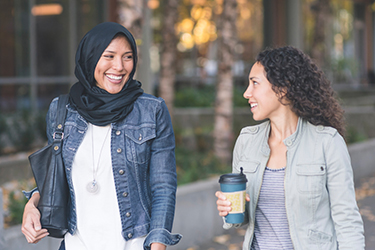Populations of color in the U.S. are often missed when researchers collect medical data, leading to gaps in research.
The All of Us Research Program, part of the National Institutes of Health, is working rectify the problem by creating one of the most extensive and diverse datasets in health and medicine. The goal is to improve health and medicine for groups typically underrepresented in medical research, gathering data for at least 10 years.
One of the program’s partners is the Arab Community Center for Economic and Social Services, which is helping bring people of Arab descent into the program. Since partnering with All of Us in 2017, the center has recruited hundreds of participants.
Arab Americans are often excluded from health data because they are categorized as white on medical forms, despite their Middle Eastern or North African background. The lack of representation fails to adequately represent the unique health challenges faced by this population.
The Nation’s Health spoke with Alhawraa Alkhafaji, MHA, about Arab American participation in All of Us and the importance of community advocacy. Alkhafaji is public health coordinator at the ACCESS Community Health and Research Center.
How did ACCESS get involved with All of Us?
It was actually the organization Henry Ford Health that recognized all the work that ACCESS does in the Dearborn-Detroit community here in Michigan. They work really close with people from the MENA (Middle Eastern North African) population.
Henry Ford spoke to All of Us and ACCESS about the partnership. ACCESS was happy to be a part of such a great program, especially because they are representing the people that they work with.
What we do is really educate the community on the program. We let the community know what the All of Us Research Program is, why it's important to take part.
What health or medical problems are common in Arab American communities?
We have a lot of refugees that come from Syria, Iraq, Yemen and Palestine, and individuals that immigrated from Lebanon. We also have first-generation Americans of that background. There are a lot of medical challenges when it comes to any individual, but something that's very large with the Arab communities would be chronic diseases — hypertension, diabetes and heart disease.
We also have barriers to health care due to immigration status, poverty and mistrust in the system. That plays a really big role in people not seeking treatment and that leads to more health concerns. (A problem) starts really simple and ends up leading to something more severe because of these barriers.
What concerns are commonly expressed by prospective participants?
Just like any time trying to convince an individual to do something, there's flags that rise. With our community, it's related to data security and privacy. It’s hard for individuals to trust the system or anything related to the government.
We always ensure them that the program takes extra precaution to secure their data to make sure that that information is not linked back to them. We explain to them that the program really cares about their privacy. We are slowly building that trust.
Why is it important for Arab Americans to be part of medical research?
You always have to advocate for your communities. There's such a great amount of minorities here in the states and a lot of them are overlooked or underrepresented because they are a smaller group of people.
It is our job to really push those individuals to advocate for themselves by being a part of this program and providing accurate data on the MENA population. Because what better way to speak for our community than from the community itself?
The All of Us program “sees participants as partners.” What does that mean to the agency?
This is one of my favorite sayings from the program. For me and for our agency, it really means giving value to the participant, allowing them to have active involvement, making decisions, creating that transparency and empowering our community on building that trust.
What results have come from All of Us research that could improve the health of Arab Americans?
I haven't seen direct results just yet. But I see that light that comes from an individual's eyes or their face when you let them know that there's a medical program out there and they are representing our community. That's what people want — to be recognized and to be cared for.
I see trust that's being built in our community when it comes to government work or medical research. Overall, the program has really brought that for our community, and that's why we've had hundreds of individuals take part in being a participant.
Over time, I definitely do see that the All of Us program is going to have a big impact on Arab individuals. And that's why we're going to continue to work with them and hope to see the best results once we hit that 10-year mark with the program.
Photo by FatCamera, courtesy iStockphoto